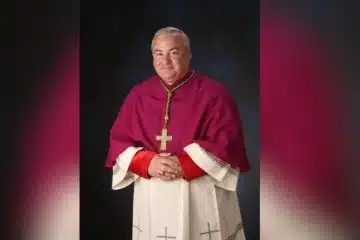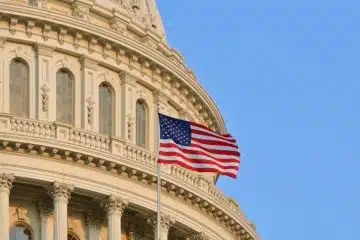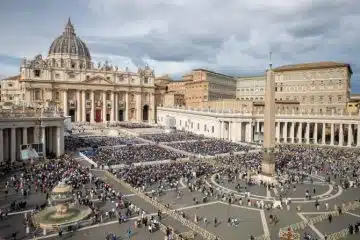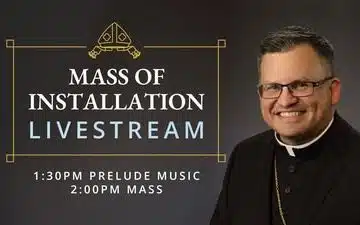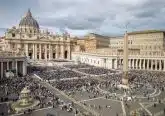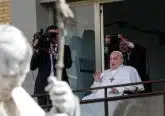Returning to the Eucharist with Joy
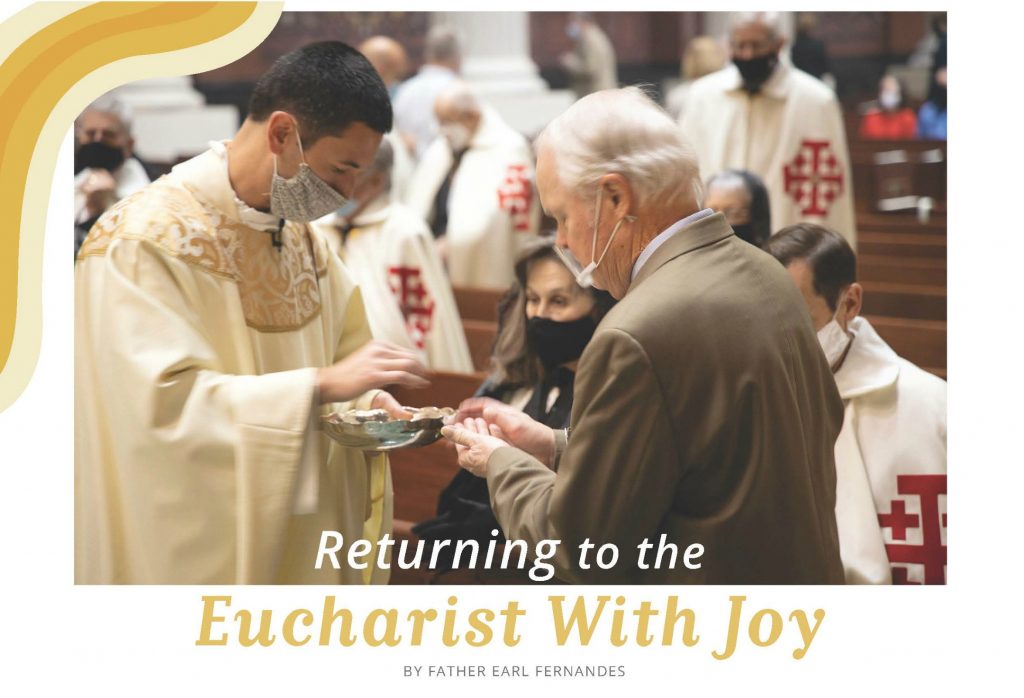 After five years away, I am happy to return to writing for The Catholic Telegraph; however, I am even happier that many people are returning to Mass after the lockdown precipitated by the pandemic. While observing safety precautions, people are returning gradually to the Eucharist, even if things don’t quite look or feel the same. We should rejoice that we have the option of public worship. Some countries, like Ireland and France, have prohibited public worship again; in France, the government has even prohibited Catholics from protesting against the prohibition of public worship!
After five years away, I am happy to return to writing for The Catholic Telegraph; however, I am even happier that many people are returning to Mass after the lockdown precipitated by the pandemic. While observing safety precautions, people are returning gradually to the Eucharist, even if things don’t quite look or feel the same. We should rejoice that we have the option of public worship. Some countries, like Ireland and France, have prohibited public worship again; in France, the government has even prohibited Catholics from protesting against the prohibition of public worship!
There have been times throughout history when Christians were prohibited from worship. In a recent letter entitled “Returning to the Eucharist with Joy,” Cardinal Robert Sarah, recalled the Christians of Abitnae who, in the Year 304, gathered for Mass despite a prohibition. When confronted by the authorities about why they defied the Emperor, they replied, “Sine Dominco non possumus” – “Without Sunday, we are unable to live.” Recent restrictions on public worship cause us to examine whether this is true for us.
 While many have watched Mass online, that it is simply not the same; we need to be together. Pope Francis said as much: “Familiarity with the Lord is always communal. Yes, it is intimate, it is personal, but in community. A familiarity without community, a familiarity without Bread, a familiarity without the Church, without the people, without the sacraments is dangerous. It can become a familiarity … for me alone, detached from the People of God. The familiarity of the Apostles with the Lord was always communal … The Church, the sacraments, the People of God are concrete. It is true that at this moment we must make this familiarity with the Lord in this way [through television or internet], but we need to get out of the tunnel, not stay there!” (Pope Francis, Homily, Apr. 17, 2020)
While many have watched Mass online, that it is simply not the same; we need to be together. Pope Francis said as much: “Familiarity with the Lord is always communal. Yes, it is intimate, it is personal, but in community. A familiarity without community, a familiarity without Bread, a familiarity without the Church, without the people, without the sacraments is dangerous. It can become a familiarity … for me alone, detached from the People of God. The familiarity of the Apostles with the Lord was always communal … The Church, the sacraments, the People of God are concrete. It is true that at this moment we must make this familiarity with the Lord in this way [through television or internet], but we need to get out of the tunnel, not stay there!” (Pope Francis, Homily, Apr. 17, 2020)
We need to get out of the tunnel for Mass, which is the “source and summit” of ecclesial life. To truly live, we need God’s life-giving Word, which, when proclaimed in the assembly, shapes our hearts and fills them with joy. We cannot live without the sacrifice of Calvary, offered at each Mass, where the Lord gives Himself to us, and we unite ourselves to Him and His merciful embrace.
Can we live without the Eucharist? The pandemic has helped us become aware of how much we take the Eucharist for granted. Once, the Church sent me to Armenia, and the Catholics there had not had Mass for six months because there were no priests! When we do not eat, we grow weak and become sick. The lack of reception of the Eucharist makes us vulnerable to sin. Without this Spiritual Food, we lose the strength to fulfill our duties. Rightly, the Eucharist is called the Bread of Life; it sustains us now and carries the promise of eternal life.
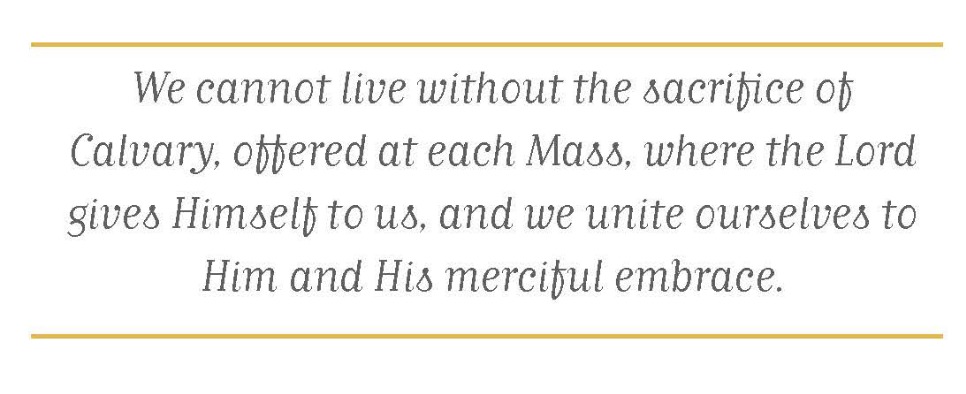 Can we live without our churches? We have a need to pray in particular places and to gather in those spaces as a community. The church building reminds us of God’s presence in the midst of His people and of our need to worship Him. In his 2020 Epiphany homily, Pope Francis said, “Once we lose the sense of worship, we lose our direction in the Christian life, which is a journey towards the Lord, not towards ourselves.” He added, “In the Christian life, it is not enough to be knowledgeable; unless we step out of ourselves, unless we encounter others and worship, we cannot know God. Theology and pastoral effectiveness mean little or nothing unless we bend the knee… Once we worship, we come to realize that faith is not simply a set of fine doctrines but a relationship with a living Person whom we are called to love.” (Pope Francis, Homily, Jan. 6, 2020)
Can we live without our churches? We have a need to pray in particular places and to gather in those spaces as a community. The church building reminds us of God’s presence in the midst of His people and of our need to worship Him. In his 2020 Epiphany homily, Pope Francis said, “Once we lose the sense of worship, we lose our direction in the Christian life, which is a journey towards the Lord, not towards ourselves.” He added, “In the Christian life, it is not enough to be knowledgeable; unless we step out of ourselves, unless we encounter others and worship, we cannot know God. Theology and pastoral effectiveness mean little or nothing unless we bend the knee… Once we worship, we come to realize that faith is not simply a set of fine doctrines but a relationship with a living Person whom we are called to love.” (Pope Francis, Homily, Jan. 6, 2020)
Things are different in our churches without as much music and other “fanfare,” but we should recall that “full, conscious, and active participation” involves deep, interior participation
– entering into the act of Christ – an act of love that changes our hearts. The frenetic pace of life, constant activity at Mass, and a lack of silence can be obstacles to an authentic encounter with the Lord.
At Christmas, we reflected on how the shepherds and Magi were filled with joy when seeing the Christ Child. The lepers, the Samaritan woman at the well, and Zacchaeus the tax collector all rejoiced in their encounters with Jesus by which they experienced His love for them. Mass is not a mere obligation but an encounter with Our Lord, who opens up a new horizon on life and fills our hearts with joy. Let us, therefore, return to the Eucharist with joy!
This article appeared in the January 2021 edition of The Catholic Telegraph Magazine. For our complimentary subscription, click here.


